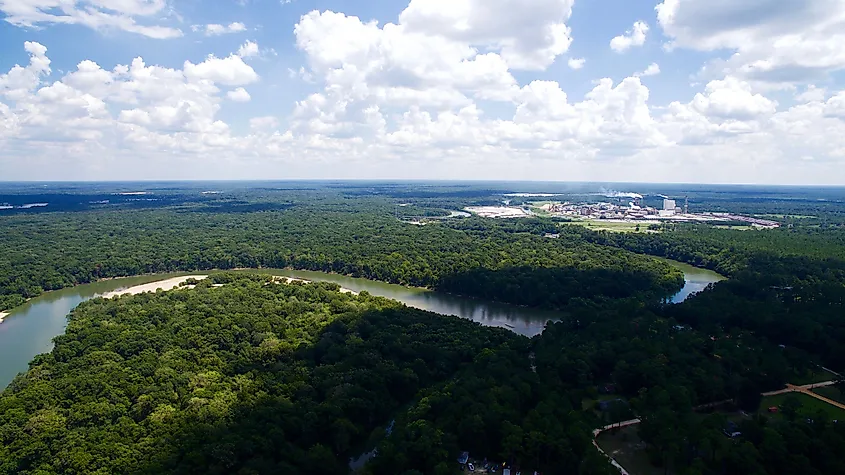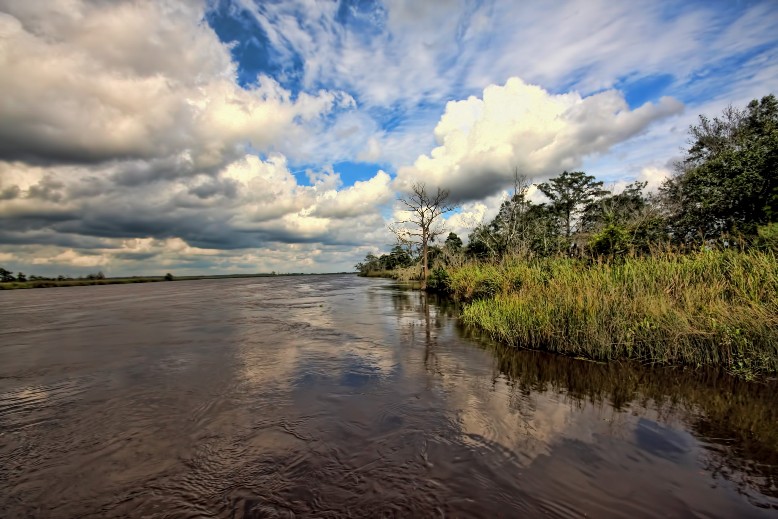The Altamaha River: A Lifeline Through Georgia’s Coastal Plain
Related Articles: The Altamaha River: A Lifeline Through Georgia’s Coastal Plain
Introduction
In this auspicious occasion, we are delighted to delve into the intriguing topic related to The Altamaha River: A Lifeline Through Georgia’s Coastal Plain. Let’s weave interesting information and offer fresh perspectives to the readers.
Table of Content
The Altamaha River: A Lifeline Through Georgia’s Coastal Plain

The Altamaha River, a prominent waterway traversing the heart of Georgia’s coastal plain, is a testament to the intricate web of natural systems that define the state’s diverse landscape. This article delves into the geographical significance of the Altamaha River, exploring its unique features, ecological importance, and the role it plays in the lives of the communities it sustains.
A River of Distinction: Geographical Features and Origins
The Altamaha River, the largest river entirely within the state of Georgia, originates from the confluence of the Oconee and Ocmulgee Rivers near the city of Darien. It meanders for approximately 140 miles before emptying into the Atlantic Ocean, forming a vast estuary known as the Altamaha Sound. This river’s journey is characterized by a unique blend of freshwater and saltwater environments, creating a rich tapestry of habitats that support a diverse array of flora and fauna.
The Altamaha’s Lifeline: Ecological Importance
The Altamaha River serves as a crucial ecological corridor, providing a vital habitat for numerous species of fish, birds, reptiles, and mammals. Its meandering course creates a mosaic of diverse ecosystems, including cypress swamps, bottomland hardwood forests, and tidal marshes. These habitats are essential for the survival of numerous endangered and threatened species, including the wood stork, the American alligator, and the Atlantic sturgeon.
- A Haven for Biodiversity: The river’s unique environment supports a rich diversity of fish species, including striped bass, red drum, and tarpon. Its waters are also a vital breeding ground for numerous species of migratory birds, such as the wood duck, the great blue heron, and the bald eagle.
- A Vital Nutrient Cycle: The Altamaha River plays a crucial role in the nutrient cycle of the surrounding coastal ecosystems. Its waters transport nutrients from the interior of the state to the coastal plain, enriching the soil and supporting the growth of diverse plant and animal communities.
- A Natural Buffer: The Altamaha River and its associated wetlands act as a natural buffer against storm surges and flooding, protecting coastal communities from the impacts of severe weather events.
A River of Economic Significance: Human Interaction and Development
The Altamaha River has been a vital resource for human communities for centuries. Its fertile floodplains have been used for agriculture, while its waters have provided transportation and access to resources. The river’s rich history is reflected in the numerous towns and cities that have sprung up along its banks, each with its own unique character and cultural heritage.
- Agriculture and Forestry: The Altamaha River’s fertile floodplains support a thriving agricultural industry, with cotton, corn, and soybeans being major crops. The surrounding forests also provide valuable timber resources, contributing to the region’s economy.
- Tourism and Recreation: The Altamaha River’s scenic beauty and abundant wildlife attract visitors from across the country. Its waters offer opportunities for fishing, boating, and kayaking, while its surrounding forests and wetlands provide a haven for birdwatching and nature photography.
- Transportation and Commerce: The Altamaha River played a crucial role in the development of Georgia’s economy, serving as a vital transportation route for goods and people. While its role in commercial shipping has diminished, the river remains an important waterway for recreational boating and fishing.
The Altamaha’s Challenges: Threats and Conservation Efforts
Despite its ecological and economic importance, the Altamaha River faces a number of challenges, including pollution, habitat loss, and climate change. These threats have led to a decline in water quality, a reduction in biodiversity, and an increased risk of flooding.
- Pollution: Industrial activities, agricultural runoff, and wastewater discharge contribute to pollution in the Altamaha River. These pollutants can harm aquatic life, degrade water quality, and pose risks to human health.
- Habitat Loss: Development, deforestation, and agricultural practices have resulted in the loss of valuable habitat along the Altamaha River. This loss threatens the survival of numerous species and disrupts the delicate balance of the river’s ecosystem.
- Climate Change: Rising sea levels, increased storm intensity, and changes in precipitation patterns pose significant challenges to the Altamaha River. These changes can lead to saltwater intrusion, flooding, and erosion, impacting the river’s ecosystem and the communities it sustains.
Despite these challenges, there are numerous organizations and individuals working to protect and restore the Altamaha River. These efforts focus on reducing pollution, restoring habitat, and mitigating the impacts of climate change.
FAQs About the Altamaha River
Q: What is the significance of the Altamaha River’s name?
A: The name "Altamaha" is derived from the Native American language of the Creek people, who inhabited the region before European colonization. It is believed to mean "river of the flat land" or "river of the swamps," reflecting the river’s course through the coastal plain.
Q: What are the major tributaries of the Altamaha River?
A: The Altamaha River’s primary tributaries are the Oconee and Ocmulgee Rivers. These rivers converge near the city of Darien, forming the Altamaha River.
Q: What are some of the most notable species found in the Altamaha River?
A: The Altamaha River is home to a diverse array of species, including the wood stork, the American alligator, the Atlantic sturgeon, the striped bass, the red drum, and the tarpon.
Q: What are the main threats to the Altamaha River’s ecosystem?
A: The Altamaha River faces threats from pollution, habitat loss, and climate change. These factors can degrade water quality, reduce biodiversity, and increase the risk of flooding.
Q: What are some of the conservation efforts being undertaken to protect the Altamaha River?
A: Organizations and individuals are working to protect the Altamaha River through efforts to reduce pollution, restore habitat, and mitigate the impacts of climate change. These efforts include promoting sustainable land management practices, restoring wetlands, and advocating for policies that protect the river’s ecosystem.
Tips for Visiting the Altamaha River
- Explore the Altamaha River by boat: Rent a kayak or canoe and enjoy a leisurely paddle down the river, taking in the scenic beauty and diverse wildlife.
- Visit the Altamaha River State Park: The state park offers a range of activities, including hiking, camping, fishing, and boating.
- Explore the Altamaha River’s historic towns: Visit towns like Darien, Brunswick, and Jesup, each with its own unique history and culture.
- Attend a local festival: Numerous festivals celebrate the Altamaha River’s cultural heritage, such as the Darien River Festival and the Altamaha River Heritage Festival.
Conclusion
The Altamaha River is a vital resource for the state of Georgia, providing ecological, economic, and cultural benefits. Its diverse ecosystems support a wealth of plant and animal life, while its waters have played a significant role in the development of the region. However, the river faces challenges from pollution, habitat loss, and climate change. Protecting and restoring the Altamaha River requires a concerted effort to address these threats and ensure that this vital waterway continues to thrive for generations to come.








Closure
Thus, we hope this article has provided valuable insights into The Altamaha River: A Lifeline Through Georgia’s Coastal Plain. We appreciate your attention to our article. See you in our next article!